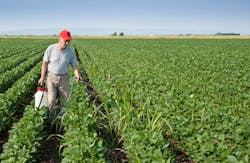Farmers shift focus over Food Safety Modernization Act cost concerns
While implementation of the Food Safety Modernization Act (FSMA) is expected to improve food safety across the entire supply chain, it has also caused concerns that many farmers and food manufacturers will be unable to meet the costs. The problem is particularly serious among smaller farms in certain states, including Ohio.
According to the Akron Beacon Journal, the changes outlined by the Food and Drug Administration (FDA) will lead to the closedown of many farms. In fact, some are already giving up ahead of the regulations even being finalized. Don Bessemer, who runs a farm within the city of Akron, Ohio, has decided to stop producing vegetables because he estimated that the costs would be impossible for him to cover. Although he did not want to quit operations, he claimed he was forced out of the business.
Bessemer has now decided to focus on soybeans, because commodity crops that are used to produce oil are exempt from the Food Safety Modernization Act. The law concentrates on produce like lettuce, spinach, green onions, tomatoes and fruits that are typically consumed raw and are usually associated with food-borne diseases due to contamination that leads to costly recalls of production.
However, not all local farmers are ready for such a conversion. Farmer Chris Saal, owner of Walnut Drive Gardens, claimed that he would not give up his business in Suffield Township, Portage County. Although he realizes that costs will rise, he still believes his business could afford it. Saal explained that he was already implementing very strict safety standards at the farm and he hoped the changes he would have to implement would not be dramatic.
Sereana Dresbach, deputy director of the Ohio Department of Agriculture, stated that farmers have nothing to worry about at present. The rules are still at the proposal stage and they are not expected to come into force before 2015. They would then be gradually implemented for several more years to come, so the industry will have plenty of time to prepare for the changes. A public consultation is open for comments until September 16, so if farmers feel they have proposals or objections to the draft proposal, they are welcome to express their views.
RELATED: Food processing companies face stricter regulations under Food Safety Modernization Act
Dresbach added that she fully supported the plan for a safer U.S. food industry but acknowledged the fact that the state would have to almost double the agriculture department's food safety budget to ensure the rules are strictly enforced.
Under the proposed rules, farmers will have to appoint an auditor to inspect their operations. The FDA estimated that this would cost about $4,700 a year for very small farms, $13,000 for small farms and as much as $30,500 for large farms, with some farms requiring multiple audits on an annual basis.
Still, the FDA claimed that as many as 79 percent of all U.S. produce farms will be exempt from the rules, as farms that sell less than $25,000 of produce each year will not have to comply and neither will farms that sell directly to the public and not through a third party, the Akron Beacon Journal said.

